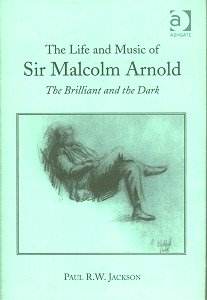'All of my music is biographical' declared Sir Malcolm
Arnold in an interview in 1991. Arnold's turbulent life has permeated
his music to a greater degree than probably any other British composer
as Paul Jackson reveals in this illuminating account. Interweaving biographical
details with close analyses of Arnold's major works, particularly the
nine symphonies, and drawing on sketch material never previously examined,
Jackson provides fascinating insights into Arnold's compositional process,
and the ideas informing such works as the John Field Fantasy and the
7th symphony.
Extensive interviews with Arnold himself as well
as with his family, friends and colleagues add further perspectives
on his relationships with fellow composers and musicians, publishers,
critics and family. A combination of joi de vivre and periods
of depression and personal tragedy, Arnold's life has mirrored his music
in its combination of seemingly disparate elemnts that make a compelling
whole.
REVIEW
Paul Jackson’s The Brilliant and the Dark is a welcome
addition to the superb Ashgate catalogue. It is an elegantly presented
book and has a pencil sketch of Arnold (drawn by son Robert Arnold in
1969) adorning the dust jacket.
Jackson’s literary style is fluent, loose and at times
chatty, and although there is much analytical study within the text,
it never becomes dry or difficult to understand. The manner in which
the book is written reminds me a little of Arnold’s music; bright, good
humoured and witty on the surface, but offset by a deep understanding
and sometimes seriousness at the very heart of things. Both men have
something worthwhile to say and the means with which to say it. I don’t
always agree with everything that Jackson writes in his book (nor should
one). Nor do I always agree with the style of writing, sentence construction
and the like; these are personal preferences and each reader will have
their own opinions on this. I also found Jackson’s own picture painting
of some works a little irksome, but as he states in the foreword "these
are my own views the conclusions are my own". There is, of course,
little wrong with offering one’s own hypotheses and conclusions as it
opens things up for lively debate.
Biographical details and musical analysis go hand-in-hand
throughout the book and are presented chronologically from the outset
(but not always strictly). Jackson is not afraid to analyse and comment
on events and pieces from different periods, and correlate them when
justifying a particular point; this is the key to thorough analysis.
The Biographical details are comprehensive and often revealing. Jackson
is candid when it comes to the facts - some
of them new - and is
not afraid of giving us the "warts and all" view, including
some rather sadly amusing bad language! Much new material
is uncovered, including insights into Arnold’s relationships with family,
friends, colleagues and of course his critics. There are also some well-presented
plates showing Arnold at work and play, but more important (to me) are
those showing old and new manuscripts and working sketches for the 7th
and 8th symphonies.
Given the sheer volume of Arnold’s catalogue,
choosing works for analysis must surely be a major task. Much of Jackson’s
analysis is concentrated upon the larger works, such as the symphonies,
concerti, ballets and some chamber music. The rest of Arnold’s output
is mentioned - some of
it at length - and put
into biographical and historical context. There is a particularly concise
chapter on Arnold’s film work, in which the author expresses some strong
views on taking film music "out of context".
The musical analysis is uncluttered, easy to follow
and brimming with musical examples. Even if you know the music the analysis
is helpful (or perhaps I should say) if you thought you knew the music.
Jackson’s in-depth research has, for me, proved the existence of ciphers
in Arnold’s music, most notably in the 5th and 7th symphonies and the
John Field Fantasy. Before reading the book I was sceptical about ciphers
in Arnold’s music, but it is not until all the evidence is presented
that one sees just how important they are. The biographical MHA (Malcolm
Henry Arnold) motif, appears in a number of compositions: Beckus, English
and Cornish Dances, Symphonies No.1 and 2, Organ Concerto, Harmonica
Concerto and so on, this must be more than coincidence.
There are three appendices. All are useful, particularly
the concise list of works, but unfortunately a discography is often
out of date very quickly and the list of films can be seen in other
literature. Reading through the notes is also interesting, but it would
be my preference to use and see footnotes rather than endnotes. The
endnotes do, however, reveal the extent of Jackson’s research; no stone
is unturned in his quest for information, which becomes very clear after
only a few pages of the main text.
So now the burning question. How does this book
compare with the likes of Burton-Page, Cole and Poulton? You must judge
that for yourselves. I can only say that Jackson’s addition to this
select band - and it
certainly is an addition because of its content -
is very welcome. All four of these books stand up individually;
the Burton-Page is mainly biographical, the Cole is seminal in its analysis
whilst the Poulton is excellent reference material. Jackson, however,
goes a little further and delves a little deeper in his exploration
of this unique composer.
Whether you are interested in Arnold and his music
or British music in general, you (like me) will find this book entertaining,
absorbing and revealing.
Philip Wood
This review first appeared in Beckus
- The Journal of the Malcolm Arnold
Society

